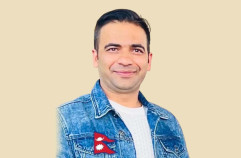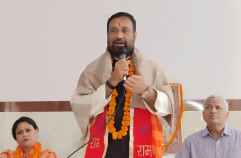World prestigious award in bioscience to Nepali scientist from UK
We use Google Cloud Translation Services. Google requires we provide the following disclaimer relating to use of this service:
This service may contain translations powered by Google. Google disclaims all warranties related to the translations, expressed or implied, including any warranties of accuracy, reliability, and any implied warranties of merchantability, fitness for a particular purpose, and noninfringement.


Professor of the University of Dundee in Scotland, United Kingdom (UK). Gopal Sapkota will be presented with the world's most prestigious award in bioscience. 49-year-old Sapkota will be awarded by 'The Biomedical Society' for the year 2025 in 'The Industry and Academic Collaboration Category'.


Established in 1911, the award is presented annually by the Society to an outstanding individual or group from anywhere in the world who has made an inspiring contribution to biological science and research. Among the nominations received from all over the world, 15 people will be awarded with cash in various categories.
dr. The Sapkota Lab, led by Sapkota, is part of Dundee University School of Life Sciences' world-renowned Medical Research Council Protein Phosphorylation and Ubiquitylation Unit. According to the Research Excellence Framework UK assessment, the University of Dundee has been ranked at the top of the UK for biological sciences research for the past 10 years.
dr. Sapkota's research focuses on how diseases such as cancer and neurodegeneration, which currently have no cure, occur and how these diseases can be treated with new technologies. Dr. Due to the invention of new technology by Sapkota, his collaboration with various pharmaceutical companies has started . This award was given to him because of his excellent and inspiring contribution to research through that collaboration. Expressing his happiness after the announcement of
award, Sapkota said that the responsibility has been increased. It is a tribute to the hard work and quality of work we have done so far. I hope this will strengthen research and collaboration in the coming days,'' he said. He also appreciated the years of hard work of the PhD students and post-doctoral researchers who worked hard in the department under his leadership.
Professor Steve Busby, Professor of Biochemistry at the University of Birmingham and Chair of the Biochemical Society Awards Committee, said: 'The list of 2025 Biochemical Society Prize winners is impressive and of course there is a wonderful mix of winners as each prize is aimed at a different section of our community. This is due to the excellent foresight of the managers and funders of the Society over many years.' He congratulated the winners and thanked the nominators, supporters, staff of the Biochemical Society and the award selection committee for their hard work.
Born in the remote Kimdanda of Arghakhanchi, Gopal Sapkota, who moved with his family to Kapilapavastu at the age of 5, received a scholarship to study at Budhanilkanth School in Kathmandu at the age of 9. He stood eighth in the 2048 SLC examination. After studying up to A level in Budhanilkanth, he started his studies at the University of Bath in UK in 1995 on a scholarship of the British Council and did his undergraduate and masters in Biochemistry . He obtained his PhD in Biochemistry from the University of Dundee in 2003 on a scholarship from Diabetes UK.
He was awarded the prestigious Damon Runyon Cancer Research Fellowship to conduct postdoctoral research at the world-renowned Memorial Sloan Kettering Cancer Center in New York. In 2006, he also received the 'Legacy of Hope' award from the Laura Hertenbaum Foundation.
Since 2008, Sapkota is a Senior Scientist in Biology, working as a Head of Research in the Medical Research Council Protein Phosphorylation and Ubiquitylation Unit in the School of Life Sciences at the University of Dundee. His research is funded by various organizations such as UK Government Medical Research Council, GSK, Amgen, Janssen Pharmaceuticals located in Belgium, Michael J. Fox Foundation located in America, Cunningham Trust, EastBio, Novo Nordisk - University of Copenhagen. This is how Dr. Sapkota continues to collaborate with many national and international organizations. Giving some examples of
collaboration, Sapkota said, 'Due to memory loss in neuro-degenerative diseases, some proteins in the brain cells stop working and accumulate, so that the cells cannot consume and die . We are now investigating whether the aggregated proteins can be removed from brain cells using techniques we have invented with the help of Yanson.'
He hopes his research will make a significant contribution to solving diseases like cancer and Parkinson's (for which there is currently no cure). He said that during his studies or work, collaboration, friendship or the opportunity to discuss with hundreds of distinguished scientists from all over the world inspired him to continue to search for answers to difficult questions in science .
Britain has had a lot of impact on research after the separation from the European Union (Brexit), but he hopes that there will be no problem in the future as Britain is now part of the EU's Horizon Program.
He is keen to utilize his knowledge, skills and expertise in Nepal as well. With the aim of promoting biomedical research and education in Nepal, he formed the 'International Nepali Biomedical Society' in 2006 along with other Nepali scientists. 'No disease discriminates on the basis of nationality. Whatever our research achieves, it can easily be delivered to Nepal as well . We are ready to encourage experts in the biomedical field to give seminars in Nepal and provide other support, he said.
He recalled that he tried to help Nepal as much as possible even during the Covid epidemic. He said, 'At the same time, many renowned Nepali biomedical scientists in the world are ready to help in every aspect of Nepali society.'
Sapkota, a health science researcher at Aberdeen University, Mrs. Dr. Sheela Tripathi currently resides in Scotland with her two daughters Shreya and Maya. His residence in Nepal is in Butwal.
प्रकाशित : वैशाख २, २०८१ १६:५६
 २१.१२°C काठमाडौं
२१.१२°C काठमाडौं

















